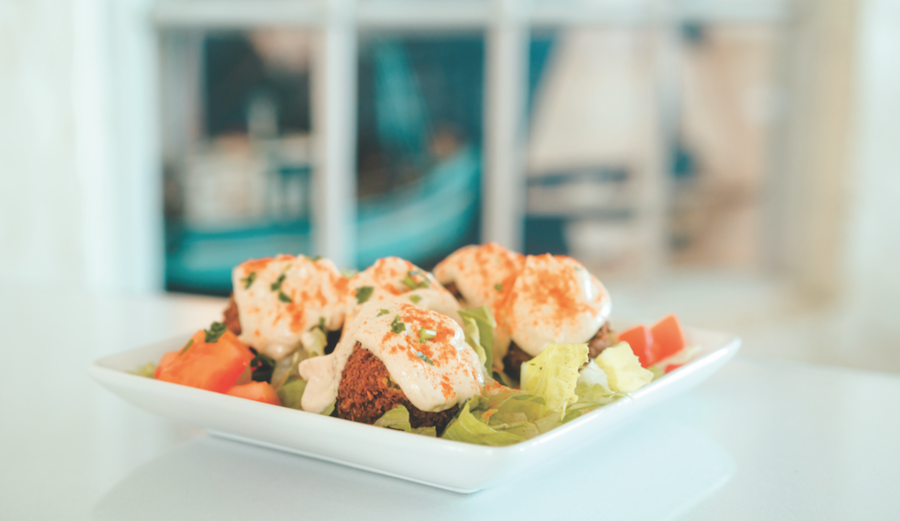Archaeological evidence suggests that the Aegean coastline of Turkey has been continuously settled by humans for over 40,000 years. Anatolians, Thracians, Greeks, Romans and Ottoman Turks all colored the history of the region, sharing cultures, languages and cuisines, the latter congealing into a cohesive style during the reign of the Ottoman Empire. Ersen Irsel, owner-operator of Bodrum Restaurant in downtown Venice, is a product of this rich history.
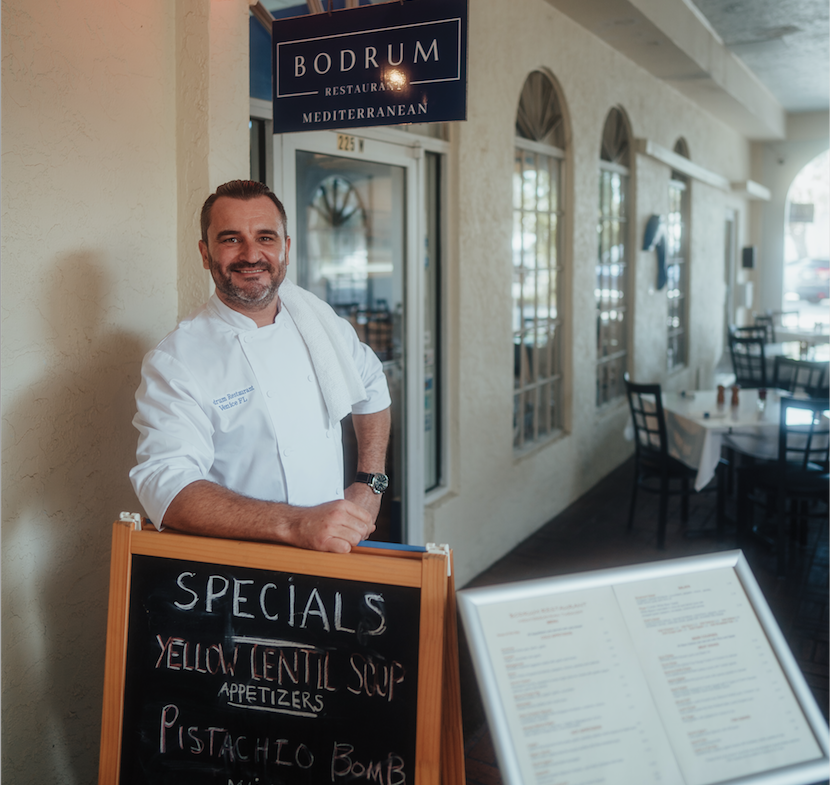
CHEF ERSEN IRSEL STANDS IN THE BREEZEWAY DINING AREA OF HIS RESTAURANT BODRUM, 225 MAIMIA AVE. W., VENICE, 941-412-0090, BODRUMFL.COM
Born in Edirne in Northwest Turkey, a place where his family goes back generations, Irsel and his wife Yuliya founded Bodrum five years ago, naming it after the seaside district and port city in Southwest Turkey to celebrate the rich, broad culinary heritage of the Eastern Mediterranean. While steeped in the ancient culinary history of his home country, Irsel also worked in the cut-throat restaurant industry of Manhattan, slicing, dicing and sauteeing his way through the kitchen of Amaranth, a contemporary Mediterranean restaurant nestled between Madison Avenue and the south end of Central Park. With his feet planted firmly in the traditional and the modern, Irsel put together a white tablecloth establishment where elevated Aegean staples can be enjoyed in a fine dining atmosphere.
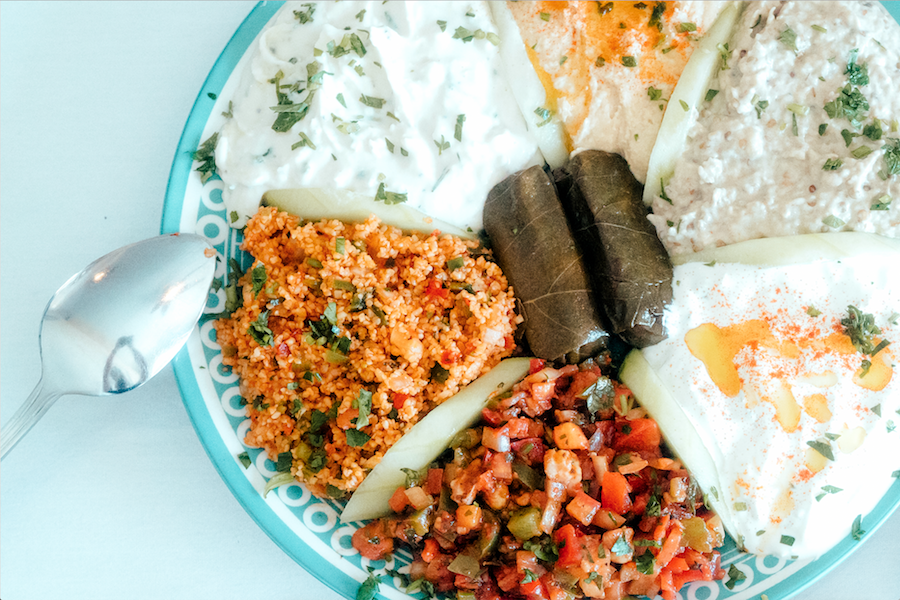
A MEZZE SAMPLER OFFERS DINERS A BROAD SURVEY OF TURKISH APPETIZERS, FROM SMOKY BABA GANOUSH TO EZME SALAD.
And it all starts with mezze.

The most notable and savory mezze includes the carrot tarator and “mom’s” potato dip. The tarator sees shredded carrots sauteed in extra virgin olive oil then mixed with Greek yogurt, walnuts, garlic and spices. Immensely creamy, a tad sweet and unapologetically rich, the tarator spread is a Turkish specialty not found in any other restaurant in town. The same goes for the potato dip—yes, his mother’s recipe—another silky and savory spread seasoned with dill and cucumber that tastes somewhere between tzatziki and potato salad. For adventurous parties of four or more, a sample mezze platter offers the best opportunity to explore the wonderful world of Aegean appetizers.
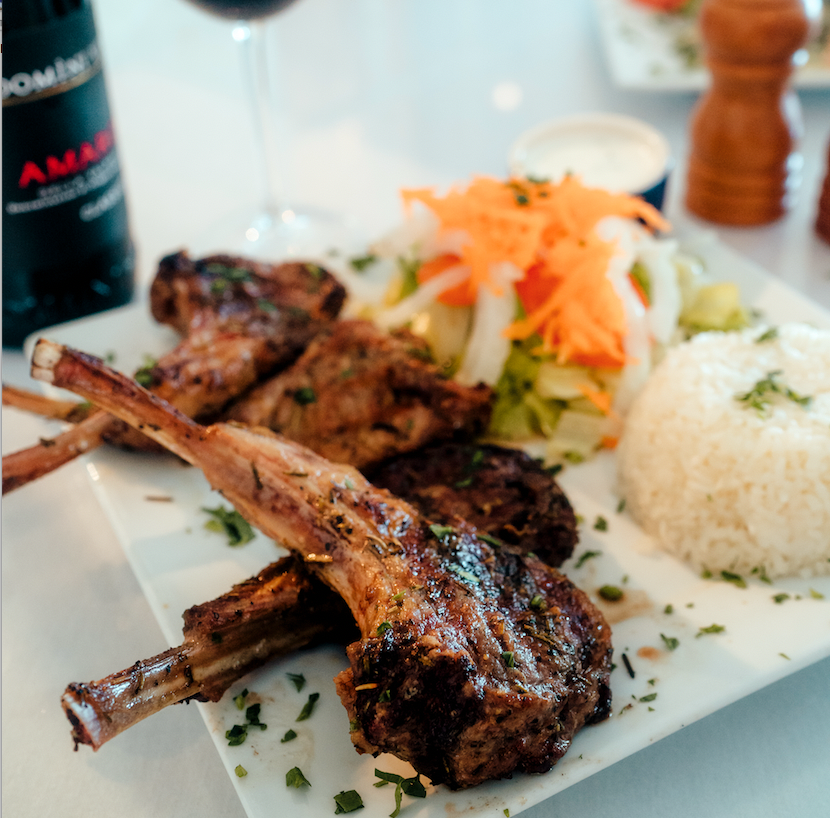
BODRUM HAS WON OVER MANY A LAMB SKEPTIC WITH ITS SIMPLE GRILLED PREPARATION SEASONED WITH SALT, PEPPER AND ROSEMARY.
All through Greece, Turkey and the Levant, appetizers like hummus, baba ganoush or tabouli feature prominently as snacks or a first course. Bodrum offers two of the aforementioned mezze with notable and delicious tweaks compared to the most commonly found versions in the US. Unlike most tabouli, which is composed primarily of chopped parsley, the Turkish style (kisir) is heavier on the cracked wheat. More savory than tangy, the tabouli eats more like couscous than it does a salad. For the baba ganoush, an admittedly healthy and hearty dip, Irsel makes use of smoked eggplant and ample garlic, giving it a whole new dimension of flavor that most Mediterranean or Middle Eastern restaurants strive to achieve.
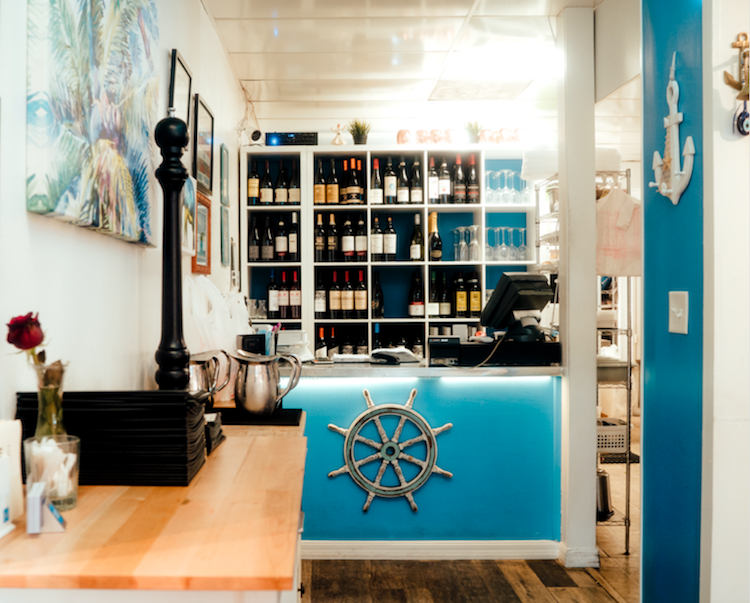
A NAUTICAL, SANTORINI-STYLE LOOK TO THE INTERIOR PAYS HOMAGE TO IRSEL’S ROOTS ON THE AEGEAN COAST.
Entrees lean heavily on land-dwelling creatures of the ungulate variety, with two standout lamb dishes. The beyti kebab takes grass-fed ground lamb seasoned with Irsel’s blend of Turkish spices like sumac and red pepper flakes, then skewers and grills the meat before wrapping it in lavash. Topped with a drizzle of three different sauces—yogurt, tomato and butter—the kebabs look something like enchiladas but possess the pastoral flavor of the grass-finished meat. Sourced from New Zealand, the lamb chop entree has been winning over skeptics since day one. “A lot of people say they hate the smell of lamb when it’s cooking,” says Irsel, “but everybody that tries it here seems to order it again and again.” Seasoned modestly with salt, pepper and rosemary leaves, the four chops come with rice and a salad of romaine, onion, tomato, cucumber and shredded carrot.

Of course, no cuisine from a country with as much coastline as Turkey would be complete without a seafood entree. Both a chargrilled swordfish and salmon enjoy permanent homes on the menu, but the halibut and caper sauce stands out. A seasonal special, the light, firm and buttery fish comes topped with a creamy, tangy sauce seasoned with lemon juice and spices, with tomato and olives mixed in. Though the mild taste of the halibut serves as a worthy canvas for the sauce, it would be interesting to see it served atop a Gulf-caught fish like yellowfin, tuna or grouper.
Still, the food exudes something timeless, as though the eons of civilization in Western Turkey helped to distill everything tasty into a single cuisine. Vegetables and legumes abound, as do high doses of protein and fiber, nothing too hefty with excess calories, all of it seasoned delicately with spices in use for thousands of years. It’s all filling, but not in that weighty, three-day food coma kind of way. The menu might accurately be described as Turkish with Greek sprinkled in, yes, but it’s also more universal than that. Call it food for building civilizations.




